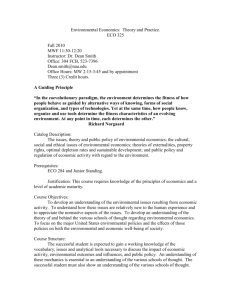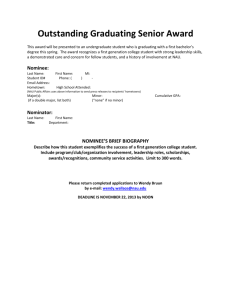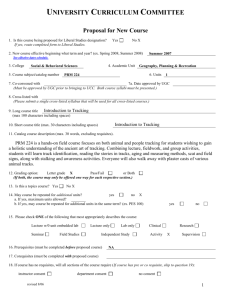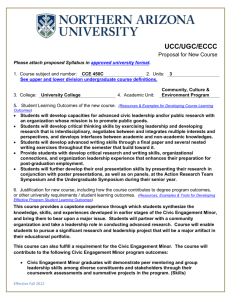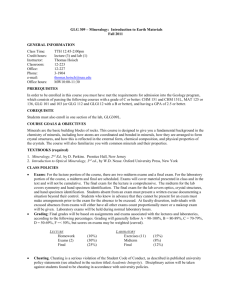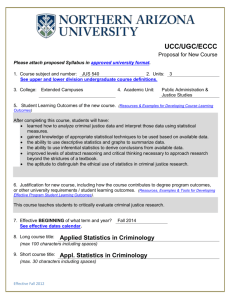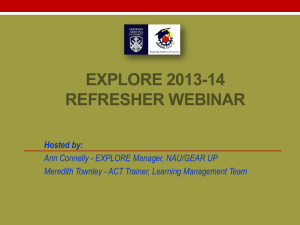For Committees use only - nau.edu
advertisement
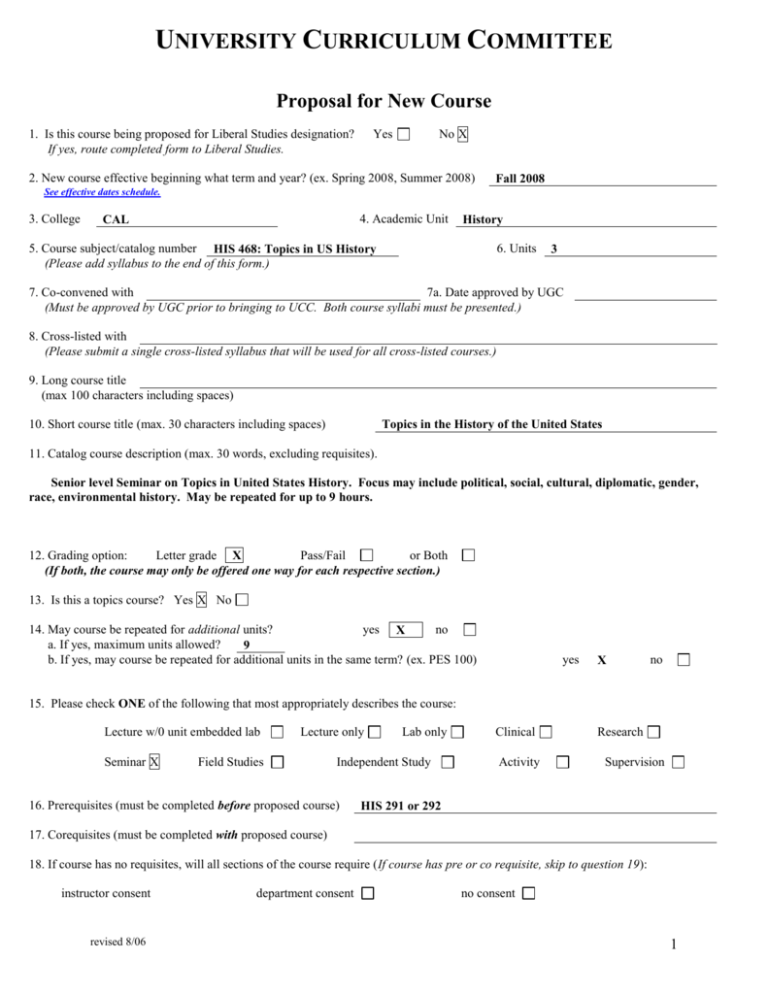
UNIVERSITY CURRICULUM COMMITTEE Proposal for New Course 1. Is this course being proposed for Liberal Studies designation? If yes, route completed form to Liberal Studies. Yes No X 2. New course effective beginning what term and year? (ex. Spring 2008, Summer 2008) Fall 2008 See effective dates schedule. 3. College 4. Academic Unit CAL History 5. Course subject/catalog number HIS 468: Topics in US History (Please add syllabus to the end of this form.) 6. Units 3 7. Co-convened with 7a. Date approved by UGC (Must be approved by UGC prior to bringing to UCC. Both course syllabi must be presented.) 8. Cross-listed with (Please submit a single cross-listed syllabus that will be used for all cross-listed courses.) 9. Long course title (max 100 characters including spaces) 10. Short course title (max. 30 characters including spaces) Topics in the History of the United States 11. Catalog course description (max. 30 words, excluding requisites). Senior level Seminar on Topics in United States History. Focus may include political, social, cultural, diplomatic, gender, race, environmental history. May be repeated for up to 9 hours. 12. Grading option: Letter grade X Pass/Fail or Both (If both, the course may only be offered one way for each respective section.) 13. Is this a topics course? Yes X No 14. May course be repeated for additional units? yes X no a. If yes, maximum units allowed? 9 b. If yes, may course be repeated for additional units in the same term? (ex. PES 100) yes X no 15. Please check ONE of the following that most appropriately describes the course: Lecture w/0 unit embedded lab Seminar X Lecture only Field Studies Lab only Independent Study 16. Prerequisites (must be completed before proposed course) Clinical Activity Research Supervision HIS 291 or 292 17. Corequisites (must be completed with proposed course) 18. If course has no requisites, will all sections of the course require (If course has pre or co requisite, skip to question 19): instructor consent revised 8/06 department consent no consent 1 19. Is the course needed for a plan of study (major, minor, certificate)? yes Name of new plan? Note: A new plan or plan change form must be submitted with this request. no X 20. Does course duplicate content of existing courses within or outside of your college? yes no X If yes, list any courses this course may have duplicative material with and estimate percentage of duplication: Please attach letters of support from each department whose course is listed above. 21. Will this course affect other academic plans, academic units, or enrollment? yes If yes, explain in justification and provide supporting documentation from the affected departments. 22. Is a potential equivalent course offered at a community college (lower division only)? If yes, does it require listing in the Course Equivalency Guide? yes Please list, if known, the institution, subject/catalog number of the course. yes no no X x no 23. Justification for new course, including unique features if applicable. Please indicate how past assessments of student learning prompted proposed changes. (Attach proposed syllabus in the approved university format). Follows new history department articulation plan with 300 level courses being lecture based and 400 level courses devoted to topic based seminars. Past assessments of student learning suggested smaller discussion courses at the senior level would be better than lecture courses 24. Names of current faculty qualified to teach this course Amundson, Danielson, Morley, Ishii, Lubick, Meeks, Martel 25. If course will require additional faculty, space, or equipment, how will these requirements be satisfied? n/a 26. Will present library holdings support this course? yes revised 8/06 X no 2 NEW JUNIOR LEVEL WRITING COURSE (refer to question 19) 37. To which degree programs offered by your department/academic unit does this proposal apply? 38. Do you intend to offer ABC 300 and ABC 300W? yes If no, please submit a course delete form for the ABC 300. no GO TO question 42 NEW SENIOR CAPSTONE COURSE (refer to question 19) 39. To which degree programs offered by your department/academic unit does this proposal apply? 40. Does this proposal replace or modify an existing course or experience? yes If yes, which course(s)? no 41. Do you intend to offer ABC 400 and ABC 400C? yes no If no, please submit a course delete form for the ABC 400. 42. Approvals Cynthia Kosso 10/23/07 Department Chair (if appropriate) Date Chair of college curriculum committee Date Dean of college Date For Committees use only For Liberal Studies Committee Date Action taken: _____________________ Approved as submitted For University Curriculum Committee ___________________________ Approved as modified Date Action taken: Approved as submitted revised 8/06 Approved as modified 3 College of Arts and Letters Department of History History 468: Topics in US History Atomic America: Nuclear Bombs and Power in American Society Semester: Time: Credits: Instructor: Office: Office Hours: Pre-Requisites: TBA TBA 3 units Michael Amundson BS 206 TBA HIS Junior Status or Higher Course Description This course examines the history and culture of the atomic bomb and nuclear power in American society from 1945 to the present. This course will be cast broadly to include many subfields in history including diplomatic, environmental, military, history of science, cultural studies, politics, and popular culture. In many ways, this course will use a broad definition of atomic culture as a window on a number of major recent American history events including World War II, the Cold War, the arms race, the No-Nukes campaign, Native American History, the postCold War, and regional history. Although the emphasis of the readings will follow the major concerns including the atom in American thought, uranium mining in the Southwest, atomic testing in Nevada, nuclear bomb production in Colorado, and waste storage in New Mexico and Nevada, additional readings will include examinations of the bomb in film, comic books, and community studies. As a senior level seminar, HIS 468 history 498 serves as a senior level seminar intended to introduce students to theoretical approaches to the study of US History by focusing on the individual topic of the Atomic Bomb. Students will have to read both broad historical context of the nuclear age as well as case studies of specific projects and regions. This course will ask students to reconcile the details of history with its broader contexts. As a seminar styled course, students will be required to carefully read and discuss monographs and articles, critically examine films and primary sources Student Learning Outcomes 1. Students will refine information literacy, critical thinking, and research skills. They find information, evaluate it, and synthesize it into new forms of knowledge. They are guided to: a. identify specific interpretations of a topic; b. identify points of conflict between various historians’ interpretations; c. infer assumptions underlying those historians’ interpretations of the problem; d. and apply different assumptions to the same subject matter and generate alternate questions and possible conclusions. 2. Students will learn to interpret a number and variety of primary sources 3. Students will practice and refine their oral and written communication, analysis and argumentation skills Course Structure The seminar format encourages active learning and the development of a community of studentscholars through lively discussions, presentations, and debates. Students will come to class prepared to discuss assigned readings with their instructor and classmates. The course will be revised 8/06 4 structured thematically, examining the history of the atom from uranium mining to nuclear missiles, and from WWII to the 21st century. Books and Required Readings There are four assigned books for the course as well as primary sources and articles available through VISTA. Allan M. Winkler, Life Under a Cloud: American Anxiety about the Atom. Urbana: University of Illinois Press, 1993. Peter Eichstaedt, If You Poison Us: Uranium and Native Americans. Santa Fe: Red Crane Books, 1994. A. Constadina Titus, Bombs in the Backyard: Atomic Testing and American Politics. Second Edition. Reno: University of Nevada Press, 2001. Len Ackland, Making a Real Killing: Rocky Flats and the Nuclear West. Albuquerque: University of New Mexico Press, 1999. VISTA articles/chapters: John Heresy, Hiroshima, 3-55 Ferenc Szasz, “Atomic Comic Books” Michael Amundson, Yellowcake Towns, 17-35; 53-76 Michael Amundson, “Mining the Grand Canyon to Save it” Simon Ortiz, poems from Woven Stone Terry Tempest Williams, “The Clan of the One Breasted Women” Barbara Kingsolver, “In the Belly of the Beast” Eileen Welsome, Prologue to “The Plutonium Files” Scott Zeman, Confronting the “Capitalist Bomb: The Neutron Bomb and American Culture” Stewart Schwartz, introduction to Atomic Audit Scott McCutcheon, introduction to Nuclear Reactions Valerie Kuletz, introduction to The Tainted Desert Peter Van Wyck, “The American Monument” Recommended Readings Some readings may be recommended over the course of the class and when possible made available through VISTA. Course Outline Tentative Schedule * denotes electronic reserve item Week 1 Reading/Discussion Intro, Course Overview, Film: Atomic Cafe 2 The Atom in American Life, 1945-1980 Reading Discussion Winkler,1-108 *Heresy, Hiroshima, 3-55 film, Dr. Strangelove 3 The Atom in American Life, 1980-present Reading Discussion Winkler, 100-215 revised 8/06 5 *Szasz, “Atomic Comic Books” 4 Uranium Mining I Uranium pop culture films Reading Discussion Eichstaedt, 1-94 *Amundson, Yellowcake Towns, 17-35; 53-76 5 Uranium Mining II Film, The Four Corners: A National Sacrifice Area Eichstaedt, 95-195 *Amundson, “Mining the Grand Canyon to Save it” *Ortiz, poems from Woven Stone 6 Individual meeetings with professor 7 First Paper due 8 Atomic Testing I film, Radio Bikini Reading Discussion Titus, 1-86 *Williams, “The Clan of the One Breasted Women” 8 Atomic Testing II Titus, 86-170 *Kingsolver, “In the Belly of the Beast” 10 Producing Bombs I film, The Bomb’s Lethal Legacy on Hanford Ackland, 1-127 *Welsome, Prologue to “The Plutonium Files” 11 Producing Bombs II film, Secrets of a Bomb Factory on Rocky Flats Ackland, 127-251 *Zeman, Confronting the “Capitalist Bomb: The Neutron Bomb and American Culture” 12 Nuclear Waste film, The WIPP Trail: nuclear waste controversy *Schwartz, introduction to Atomic Audit McCutcheon, introduction to Nuclear Reactions 13 The Environment film, Deadly Deception: General Electric, nuclear weapons and our environment *Kuletz, introduction to The Tainted Desert revised 8/06 6 14 The Future *Van Wyck, “The American Monument” 15 individual meetings 16 Paper II due Assessment of Student Learning Outcomes Methods: Reading Notes:10 pts each Students must submit typed reading notes based on each week's assigned readings. Generally, students should count on 2-3 single spaced pages of notes for each 100 pages read. Students will be required to turn in a copy of these notes at the start of each week’s class. Papers: 100 pts each There are two 10 page papers required based on readings, discussions, films, and primary sources. Students will receive guidelines from the instructor for each specific paper. Seminar Activity 10 pts each This is a senior seminar. Students are expected to complete all required reading and actively participate in each week's discussion. This is more than attendance! If a student misses a week, the student must submit a 4-5 page analysis of that week's reading in lieu of participation. This "make-up" paper will be due one week after the absence. Timeline: Reading notes and discussion will be graded weekly. Thought papers will be due at the midterm and finals based on readings from each half of the course. Grading System Grading: Reading Notes 10 @10 pts Seminar Activity 10@ 10 pts Papers 2@100 pts Total Grading 100 pts 100 pts 200 pts 400 A: 90-100%; B: 80-89%; C: 70-79%; D: 60-69%; F:59% and below Course Policies: 1. Regular attendance is expected and necessary for success. Contact the instructor immediately if you face problems requiring you to miss class over an extended period. 2. The History Department takes academic integrity very seriously and will not tolerate acts of academic dishonesty. It is the student’s responsibility to familiarize her/himself with these matters as defined by the University. See the current NAU Student Handbook and Appendices for definitions and procedures. Plagiarism or any other form of cheating cannot be accepted. Any student participating in such activities will receive a final grade of F. 3. Students unable to take the exams at the regularly scheduled times must make special arrangements with the instructor. The instructor reserves the right to change or substitute material on the exams under these conditions revised 8/06 7 4. Late work will NOT be accepted. NORTHERN ARIZONA UNIVERSITY POLICY STATEMENTS SAFE ENVIRONMENT POLICY NAU’s Safe Working and Learning Environment Policy seeks to prohibit discrimination and promote the safety of all individuals within the university. The goal of this policy is to prevent the occurrence of discrimination on the basis of sex, race, color, age, national origin, religion, sexual orientation, disability, or veteran status and to prevent sexual harassment, sexual assault or retaliation by anyone at this university. You may obtain a copy of this policy from the college dean’s office or from the NAU’s Affirmative Action website http://www4.nau.edu/diversity/swale.asp. If you have concerns about this policy, it is important that you contact the departmental chair, dean’s office, the Office of Student Life (928-523-5181), or NAU’s Office of Affirmative Action (928-523-3312). STUDENTS WITH DISABILITIES If you have a documented disability, you can arrange for accommodations by contacting the office of Disability Support Services (DSS) at 928-523-8773 (voice), 928-523-6906 (TTY). In order for your individual needs to be met, you are required to provide DSS with disability related documentation and are encouraged to provide it at least eight weeks prior to the time you wish to receive accommodations. You must register with DSS each semester you are enrolled at NAU and wish to use accommodations. Faculty are not authorized to provide a student with disability related accommodations without prior approval from DSS. Students who have registered with DSS are encouraged to notify their instructors a minimum of two weeks in advance to ensure accommodations. Otherwise, the provision of accommodations may be delayed. Concerns or questions regarding disability related accommodations can be brought to the attention of DSS or the Affirmative Action Office. For more information, visit the DSS website at http://www2.nau.edu/dss/. INSTITUTIONAL REVIEW BOARD Any study involving observation of or interaction with human subjects that originates at NAU—including a course project, report, or research paper—must be reviewed and approved by the Institutional Review Board (IRB) for the protection of human subjects in research and research-related activities. The IRB meets monthly. Proposals must be submitted for review at least fifteen working days before the monthly meeting. You should consult with your course instructor early in the course to ascertain if your project needs to be reviewed by the IRB and/or to secure information or appropriate forms and procedures for the IRB review. Your instructor and department chair or college dean must sign the application for approval by the IRB. The IRB categorizes projects into three levels depending on the nature of the project: exempt from further review, expedited review, or full board review. If the IRB certifies that a project is exempt from further review, you need not resubmit the project for continuing IRB review as long as there are no modifications in the exempted procedures. A copy of the IRB Policy and Procedures Manual is available in each department’s administrative office and each college dean’s office or on their website: http://www4.nau.edu/ovp/regulatorycompliance/irb/index.htm. If you have questions, contact Melanie Birck, Office of Grant and Contract Services, at 928-523-8288. ACADEMIC INTEGRITY The university takes an extremely serious view of violations of academic integrity. As members of the academic community, NAU’s administration, faculty, staff and students are dedicated to promoting an atmosphere of honesty and are committed to maintaining the academic integrity essential to the education process. Inherent in this commitment is the belief that academic dishonesty in all forms violates the basic principles of integrity and impedes learning. Students are therefore responsible for conducting themselves in an academically honest manner. Individual students and faculty members are responsible for identifying instances of academic dishonesty. Faculty members then recommend penalties to the department chair or college dean in keeping with the severity of the violation. The complete policy on academic integrity is in Appendix G of NAU’s Student Handbook http://www4.nau.edu/stulife/handbookdishonesty.htm. ACADEMIC CONTACT HOUR POLICY The Arizona Board of Regents Academic Contact Hour Policy (ABOR Handbook, 2-206, Academic Credit) states: “an hour of work is the equivalent of 50 minutes of class time…at least 15 contact hours of recitation, lecture, discussion, testing or evaluation, seminar, or colloquium as well as a minimum of 30 hours of student homework is required for each unit of credit.” The reasonable interpretation of this policy is that for every credit hour, a student should expect, on average, to do a minimum of two additional hours of work per week; e.g., preparation, homework, studying. revised 8/06 8 College of Arts and Letters Department of History HIS 468: Topics in U.S. History/American Radicalism, 1880-present Semester: TBA Time: TBA Credits: 3 Instructor: Dr. Leilah Danielson Office: LA 314 Office hours: TBA Prerequisites: Sophomore status or higher Course description This course examines key themes in the history of American radicalism since 1880. We will look at populism and agrarian radicalism, socialism and communism, radicals in the labor movement, feminism, black radicalism, the New Left, and the origins and ethics of environmentalism. Student Learning Outcomes Through readings, films, discussions, and writing assignments, students will engage with and critically examine the major problems, themes, and debates in the history of the U.S. Left since the 1880s. Course Structure The course will be conducted in a seminar format. Students are expected to keep up with the reading and actively participate in the discussions. Books and Required Readings o Nick Salvatore, Eugene V. Debs: Citizen and Socialist (Urbana: University of Illinois Press, 1982) o Susan Glenn, Daughters of the Schtetl: Jewish Immigrant Women in America’s Garment Industry (Ithaca: Cornell University Press, 1990) o Penny Von Eschen, Race against Empire: Black Americans and Anticolonialism, 19371957 (Ithaca: Cornell University Press, 1997) o Doug Rossinow, The Politics of Authenticity: Liberalism, Christianity, and the New Left in America (New York: Columbia University Press, 1998) o Jane Gerhard, Desiring Revolution: Second-Wave Feminism and the Re-writing of American Sexual Thought, 1920-1980 (NY: Columbia University Press, 2001) o E-reserve readings on Blackboard Vista Recommended Readings For an overview of the history of the U.S. left, see Daniel Pope, American Radicalism (Oxford: Blackwell Publishers, 2001) Course Outline Week 1: Introduction to each other and to course o T.J. Jackson Lears, “The Concept of Cultural Hegemony: Problems and Possibilities” American Historical Review 90, no. 3 (June 1985): 567-593 o Eric Foner, Robert Westbrook, and Gerald Horne on the relationship between liberalism and the Left in U.S. History in Radical History Review 71:6-10, 34-40, 46-51 Week 2: The revolt of the “producers” revised 8/06 9 o “The Ocala Demands” and “Populist Party Platform” (primary source) o Stephen Kantrowitz, “Ben Tillman and Hendrix McLane, Agrarian Rebels: White Manhood, "The Farmers," and the Limits of Southern Populism” Journal of Southern History 66, no. 3 (August 2000): 497-524 Week 3: The heyday of American Socialism o Salvatore, Eugene V. Debs Week 4: The Immigrant Left and Working-Class Feminism o Glenn, Daughters of the Schtetl Week 5: World War I: Repression and Retreat o Randolph Bourne, “The Twilight of Idols” (primary source) o Film: Matewan Week 6: Culture and the Old Left o Mike Gold, “Go Left, Young Writers!” (primary source) o selections from Michael Denning, The Cultural Front: The Laboring of American Culture in the 20th Century (Verso, 1997), xii-160, 283-402, 423-472 o comments by Harvey Teres, Andrew Hemingway, John Bodnar, Penny M. Von Eschen, Cary Wolfe, Terry Cooney, Alfred Kazin and response by Denning in Intellectual History Newsletter 19 (1997) Week 7: Black Radicalism and the Decline of the Old Left o Von Eschen, Race against Empire o Film: Paul Robeson: Here I Stand Week 8: Postwar and Cold War o Dwight MacDonald, “The Root is Man” (primary source) o C. Wright Mills, “The Decline of the Left” (primary source) Week 9: The New Left and the 1960s o Rossinow, The Politics of Authenticity Week 10: Radical Feminism and Women’s Liberation o Gerhard, Desiring Revolution Week 11: Identity Politics and Postmodern Radicalisms o Rudolfo Anaya and Francisco Lomeli, eds., Aztlan: Essays on the Chicano Homeland, Introduction, and "El Plan Espiritual de Aztlan" o Timothy Tyson, "Robert F. Williams, ‘Black Power,’ and the Roots of the African American Freedom Struggle," Journal of American History 85 (1998), 540-570 o Terrence Kissack, "Freaking Fag Revolutionaries: New York's Gay Liberation Front, 1969-1971," Radical History Review 62 (1995), 104-134 Week 12: Radicalism in an Age of Limits o selections from David Ehrenfeld, The Arrogance of Humanism (primary source) o Richard Rorty, selection from Achieving Our Country, 3-38 (primary source) o Robin D.G. Kelley, selection from Freedom Dreams, 1-12 (primary source) Assessment of Student Learning Outcomes revised 8/06 10 Students will be assessed by the quality of their participation in class discussions, three readerresponse papers, and two 5-7 essays. Specifically, o Participation: Students will be assessed by whether they come to class having completed the assigned readings, how often they participate in class discussions, and the quality of that participation. o Three Response Papers: Everyone is REQUIRED to do three 1-2 page response papers on a set of class readings over the course of the semester (due the day the readings are assigned). We will discuss the specifics of this assignment in more detail during our first two sessions. o Two 5-7-page Essays: There will be two essay assignments for this course, one due in mid-semester and the other due at the end of the semester. We will discuss the specifics of this assignment in more detail during our first two sessions. Grading System o Participation o Three Response Papers o Two 5-7-page Essays 25% 5% each; 15% total 30% each; 60% total Course Policies Retests/make-up Tests: N/A Attendance: Attendance is mandatory, and your participation grade will be deducted by five percentage points for each absence. Statement on plagiarism and cheating: Please review the university’s Academic Integrity Code pasted below. Plagiarism is a very serious offense and can have very serious consequences for those found guilty. See me if you are having difficulty writing your papers. Classroom Management Statement Membership in the academic community places a special obligation on all members to preserve an atmosphere conducive to a safe and positive learning environment. Part of that obligation implies the responsibility of each member of the NAU community to maintain an environment in which the behavior of any individual is not disruptive. It is the responsibility of each student to behave in a manner that does not interrupt or disrupt the delivery of education by faculty members or receipt of education by students, within or outside the classroom. The determination of whether such interruption or disruption has occurred has to be made by the faculty member at the time the behavior occurs. It becomes the responsibility of the individual faculty member to maintain and enforce the standards of behavior acceptable to preserving an atmosphere for teaching and learning in accordance with University regulations and the course syllabus. At a minimum, students will be warned if their behavior is evaluated by the faculty member as disruptive. Serious disruptions, as determined by the faculty member, may result in immediate removal of the student from the instructional environment. Significant and/or continued violations may result in an administrative withdrawal from the class. Additional responses by the faculty member to disruptive behavior may include a range of actions from discussing the disruptive behavior with the student to referral to the appropriate academic unit and/or the Office of Student Life for administrative review, with a view to implement corrective action up to and including suspension or expulsion. revised 8/06 11 NORTHERN ARIZONA UNIVERSITY POLICY STATEMENTS SAFE ENVIRONMENT POLICY NAU’s Safe Working and Learning Environment Policy seeks to prohibit discrimination and promote the safety of all individuals within the university. The goal of this policy is to prevent the occurrence of discrimination on the basis of sex, race, color, age, national origin, religion, sexual orientation, disability, or veteran status and to prevent sexual harassment, sexual assault or retaliation by anyone at this university. You may obtain a copy of this policy from the college dean’s office or from the NAU’s Affirmative Action website http://www4.nau.edu/diversity/swale.asp. If you have concerns about this policy, it is important that you contact the departmental chair, dean’s office, the Office of Student Life (928-523-5181), or NAU’s Office of Affirmative Action (928-523-3312). STUDENTS WITH DISABILITIES If you have a documented disability, you can arrange for accommodations by contacting the office of Disability Support Services (DSS) at 928-523-8773 (voice), 928-523-6906 (TTY). In order for your individual needs to be met, you are required to provide DSS with disability related documentation and are encouraged to provide it at least eight weeks prior to the time you wish to receive accommodations. You must register with DSS each semester you are enrolled at NAU and wish to use accommodations. Faculty are not authorized to provide a student with disability related accommodations without prior approval from DSS. Students who have registered with DSS are encouraged to notify their instructors a minimum of two weeks in advance to ensure accommodations. Otherwise, the provision of accommodations may be delayed. Concerns or questions regarding disability related accommodations can be brought to the attention of DSS or the Affirmative Action Office. For more information, visit the DSS website at http://www2.nau.edu/dss/. INSTITUTIONAL REVIEW BOARD Any study involving observation of or interaction with human subjects that originates at NAU—including a course project, report, or research paper—must be reviewed and approved by the Institutional Review Board (IRB) for the protection of human subjects in research and research-related activities. The IRB meets monthly. Proposals must be submitted for review at least fifteen working days before the monthly meeting. You should consult with your course instructor early in the course to ascertain if your project needs to be reviewed by the IRB and/or to secure information or appropriate forms and procedures for the IRB review. Your instructor and department chair or college dean must sign the application for approval by the IRB. The IRB categorizes projects into three levels depending on the nature of the project: exempt from further review, expedited review, or full board review. If the IRB certifies that a project is exempt from further review, you need not resubmit the project for continuing IRB review as long as there are no modifications in the exempted procedures. A copy of the IRB Policy and Procedures Manual is available in each department’s administrative office and each college dean’s office or on their website: http://www4.nau.edu/ovp/regulatorycompliance/irb/index.htm. If you have questions, contact Melanie Birck, Office of Grant and Contract Services, at 928-523-8288. ACADEMIC INTEGRITY The university takes an extremely serious view of violations of academic integrity. As members of the academic community, NAU’s administration, faculty, staff and students are dedicated to promoting an atmosphere of honesty and are committed to maintaining the academic integrity essential to the education process. Inherent in this commitment is the belief that academic dishonesty in all forms violates the basic principles of integrity and impedes learning. Students are therefore responsible for conducting themselves in an academically honest manner. Individual students and faculty members are responsible for identifying instances of academic dishonesty. Faculty members then recommend penalties to the department chair or college dean in keeping with the severity of the violation. The complete policy on academic integrity is in Appendix G of NAU’s Student Handbook http://www4.nau.edu/stulife/handbookdishonesty.htm. ACADEMIC CONTACT HOUR POLICY The Arizona Board of Regents Academic Contact Hour Policy (ABOR Handbook, 2-206, Academic Credit) states: “an hour of work is the equivalent of 50 minutes of class time…at least 15 contact hours of recitation, lecture, discussion, testing or evaluation, seminar, or colloquium as well as a minimum of 30 hours of student homework is required for each unit of credit.” The reasonable interpretation of this policy is that for every credit hour, a student should expect, on average, to do a minimum of two additional hours of work per week; e.g., preparation, homework, studying. revised 8/06 12
